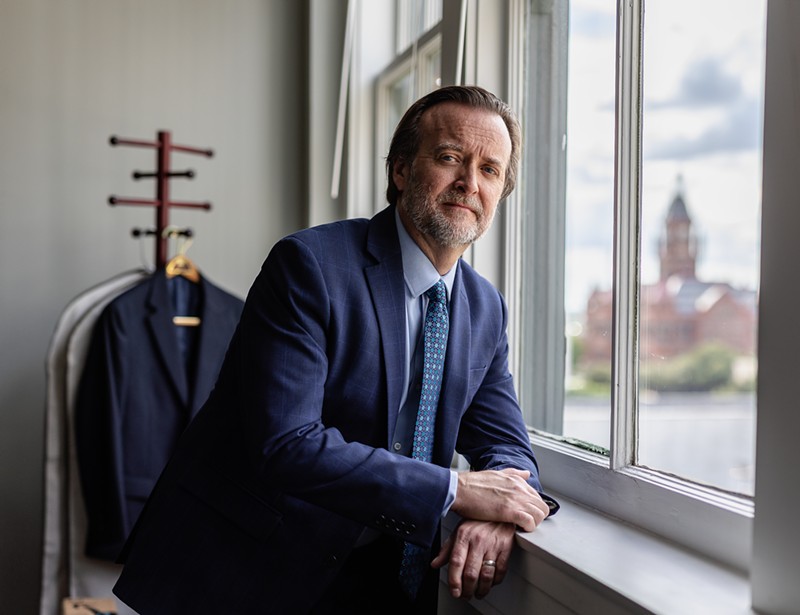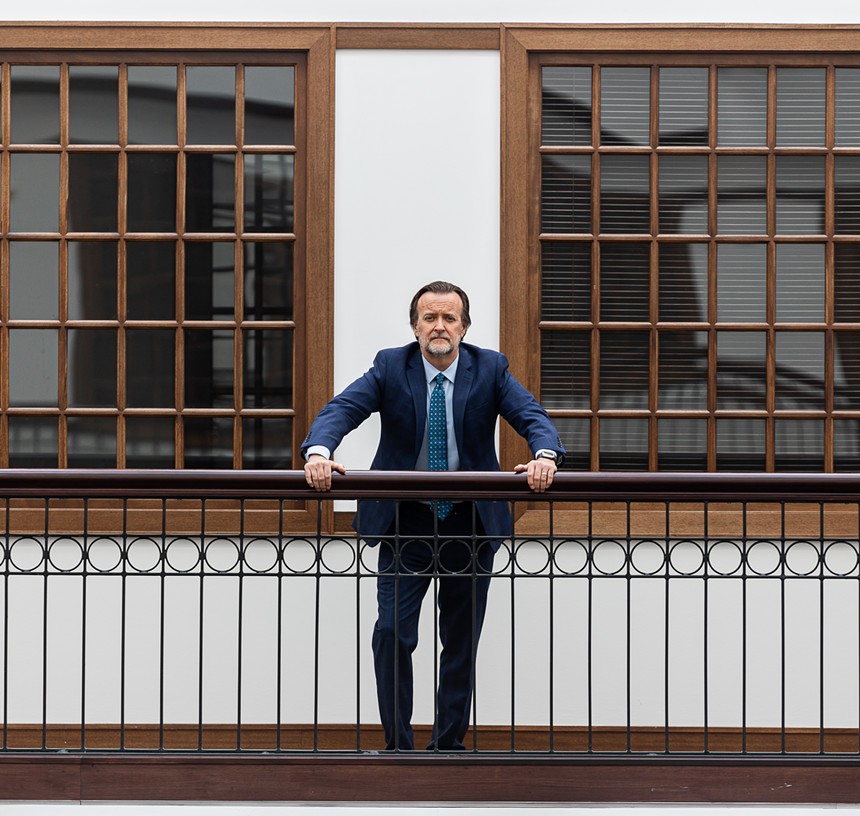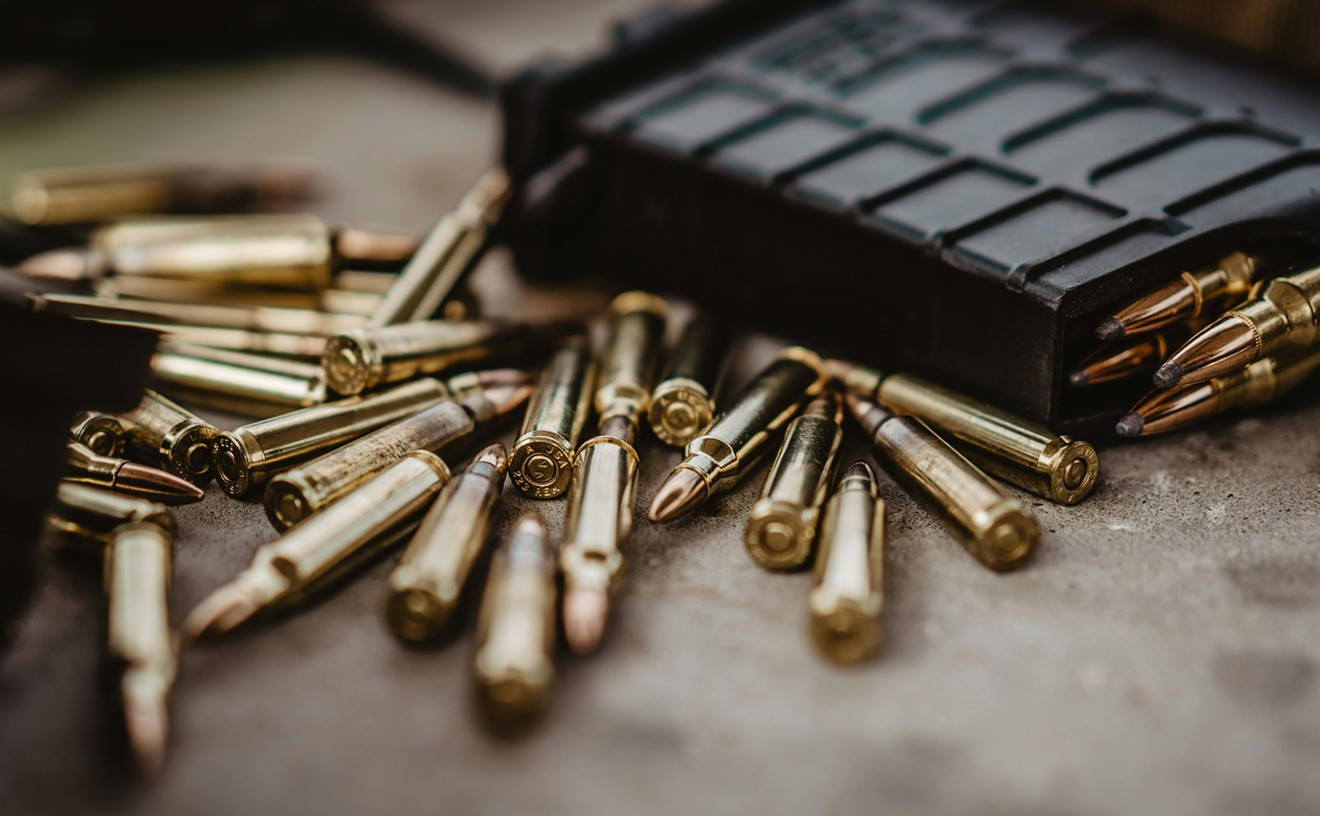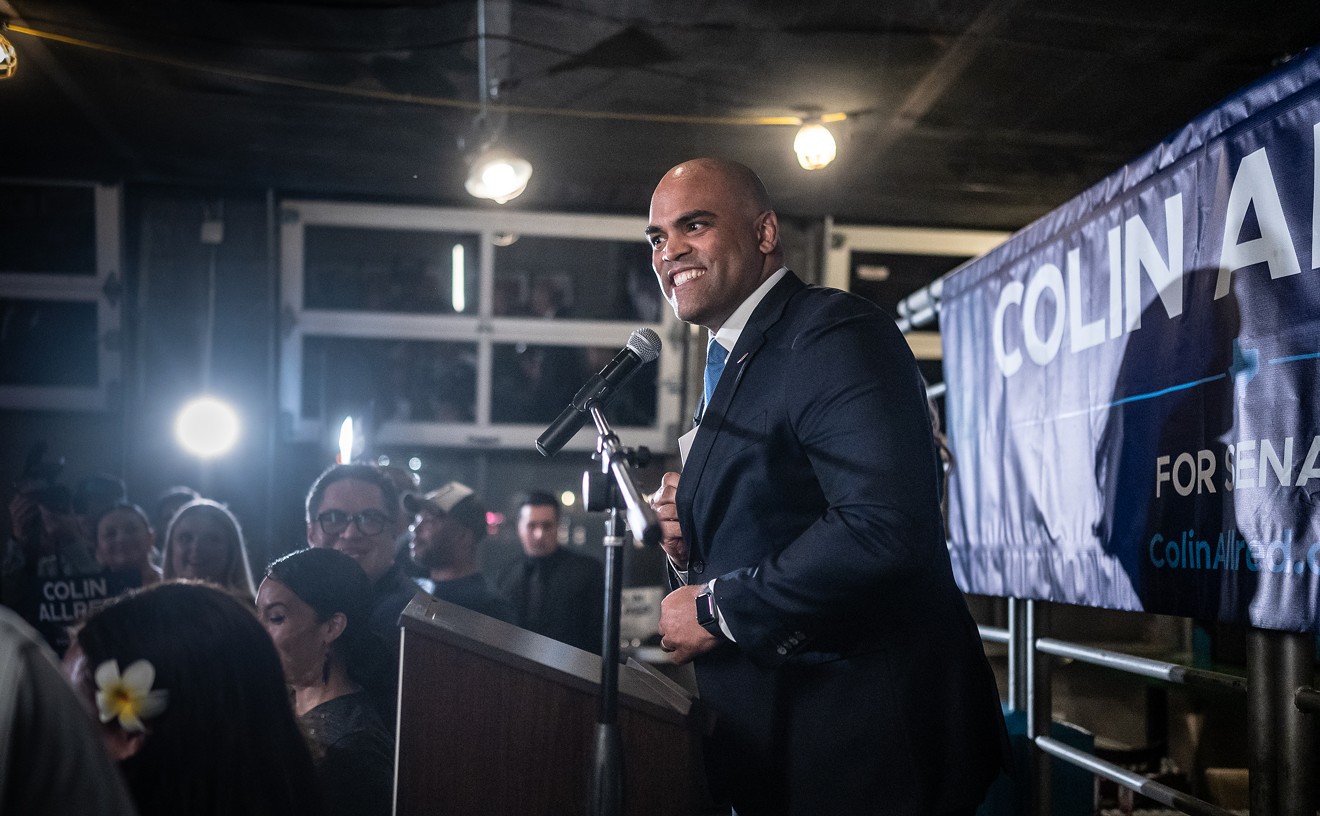The officers knew from the time they booked him that he had some mental health issues, needed medication and had tried to commit suicide before. It had all been documented. But they didn’t give him the medicine or the attention he needed.
It took Cabler nine hours and three minutes to set up the contraption that would end his life. His suicide note read, “I couldn’t be alone anymore […] I’m tired of them telling me to do it that’s all they ever say do it do it do it so fuck it I’ll do it! All I wanted was to be able to talk to somebody!!”
Cabler's mother, Kathy Cabler, says she tried to tell the guards that something bad was going to happen, but they didn’t listen.
“They wouldn’t talk to me, nobody would, as hard as I tried, and I wore myself out that last week, at least the last two weeks before he passed,” his mother said. “Something has to happen, it just does. I mean, this is ridiculous when a parent is telling you something … my child, please, and they’re not even going to give you a phone call back.”
Dean Malone, the attorney who later sued Cabler's jailers, isn’t all that interested in talking about his own upbringing. He’s more concerned with the present and the future, as well as his clients’ hardships. Still, he’ll say this of his childhood: He didn’t grow up thinking he’d become a lawyer; he just always knew he wanted to help people.
Malone represented Cabler's family and many others like it over the years, but his path to becoming one of North Texas’ leading lawyers trying to hold prisons, jails and sheriffs in the region accountable didn’t start until after he worked in an entirely different field and had a family. Nowadays, he focuses on civil rights, especially for those not-so-few people who have endured serious injuries or died while in lockup. The way he sees it, his work is to protect the constitutional rights of those who wind up incarcerated in Texas. In other words, he stays pretty busy.
Before he decided to go to law school around 25 years ago, Malone worked as an engineer. Then he decided to switch careers, and he put his all into making that happen. He already had a wife and three small children and was living in the Dallas area. But he made the 224-mile roundtrip trek to law school at Baylor University in Waco in a vehicle with an air conditioning system that eventually went out. He didn’t have the cash to fix it, but still he “drove roughly the next 26-plus months … back and forth to law school every day,” he recalled.
“I’m probably [the] only Baylor law school graduate that can say when I graduated law school, I had never a spent a night in McLennan County,” where Waco is located, he said.
Since then, he’s defended clients in cases involving constitutional rights, free speech and jail suicides, among other causes.
Fake ID, Real Consequences
All these years later, a 2017 case still drives home for Malone why he took up this line of work. “Somebody called me several years ago, a young man was arrested for nothing more than a fake ID,” Malone said. The phony ID had his client’s real name, real address and all of his real information on it. But because of an issue with a birth certificate, he had a problem getting a real one and decided to get one at a flea market. He ended up getting arrested for it.
The young man clearly had mental health problems, Malone recalled, and when he was arrested, he broke down in tears. Malone understood this client didn’t need to be punished. He needed help. The young man went to the Burkburnett City Jail, north of Wichita Falls, and one of the officers didn’t turn off his lapel microphone. Everything that followed wound up being recorded. The jailers berated him, called him names like "pansy" and made fun of him for asking for his mom, all for no reason, according to Malone. Eventually, the young man hanged himself in the cell with the drawstring of his pants.
Malone thought it could have been prevented had the jailers changed him into jail clothing, which doesn't include a drawstring. But they didn’t. “He was helpless,” the lawyer recalled. “We’re talking about a mentally ill young man who, according to what he told the officers, had attempted suicide not too long before. I made a decision pretty quickly when I began to work on that case that I was going to devote my practice to doing nothing but this since that time.”
According to the Texas Justice Initiative, some 12,218 people have died in custody in Texas since 2005. Suicides make up 11% of those, roughly the same percentages of deaths as homicide at 12%. Combined, suicide and homicide make up almost a quarter of in-custody deaths. Cases that fall into these categories can be gruesome and sad.
Krish Gundu, co-founder and executive director of Texas Jail Project, a group dedicated to the ethical treatment of the state's incarcerated population, explained that a large portion of people in jails are in pretrial, meaning they haven’t been convicted of anything; they just can’t afford bail to get out. (Chris Cabler was one such person, who ended up losing his life before he was ever tried.) Gundu said that when Texas Jail Project started, about half of incarcerated people were in pretrial; now that number is getting closer to three quarters.
“[They] are spending anywhere from six months to a year, to three years pretrial in jail, which makes no sense at all,” Gundu said. “If we could cut down that population, it would be so much easier to take care of the folks that can’t be let out … the system is so overwhelmed, it’s collapsing under its own weight. It’s not safe for the staff that works in there, it’s not safe for the people that are in cages.”
Malone knows all about gruesome and sad experiences. Take, for instance, a few of his past cases. A man in a city of Jasper jail vomited up a black substance and a baggie, but no one called for medical help; his body was later found. Another man, Gabriel Olivas, who was suicidal, poured gasoline on himself with a lighter in his hand and the officers decided to use a Taser on him. He went up in flames and died from the burns. A man named Daniel McCoy, in Williamson County, thought he was Cronos, the son of Uranus in Greek mythology, and sustained a hypoxic brain injury, dying before he could receive any medical care.
“When I tell people what I do, they say, ‘Gosh, how in the world can you deal with those cases day in and day out?’” Malone said. “I have to distance myself a bit from what happened, or I just couldn’t do it. [But] I really get satisfaction out of doing the best I can for these families who have been through horrible situations.”
From January to June 2022, there were eight deaths in Dallas County jails. One, an “Anglo” person, was deemed a suicide. The other seven deaths consisted of one Asian, one Hispanic and five African-Americans, who disproportionately populate jails in the United States.
A Legacy of Slavery
In the U.S., Gundu argued, the entire concept of how jail is run today was born from the ruins of slavery “When we abolished slavery, there was a huge labor shortage, and the way to fill that labor shortage was to start arresting people for petty stuff,” she said. “If you go back historically and look at jail populations, they would always spike during harvest season. And when they were done picking and whatever else that needed to be done, they would be let out.”
At the height of mass incarceration in the U.S., she added, the rate of Black people in jail was six times the highest number of Black people held in prisons in apartheid South Africa. When she first heard that, she couldn’t believe it. “I needed so many other pieces of corroboration before I believed that piece of data,” Gundu said. “That right there should tell us something.”
Then, there are those who have a mental illness or are living on the streets. “You see people who should be going to mental health crisis centers, or the ERs, or a substance abuse crisis center, but they’re ending up in jails, so they’re criminalizing homelessness, or criminalizing mental illness, or criminalizing disabilities,” Gundu said. “Jails are now the warehouses for people with mental illness.”
Getting arrested can turn deadly for many, but lawsuits against officers, jails or prisons are neither easy nor quick. In part, that's due to qualified immunity, a legal principle that provides protection for government officials and police officers against legal retribution unless it can be shown that they clearly violated policy or broke the law. Cases can take years to even be tried let alone resolved, and people who are incarcerated — and their families, for that matter — often can’t afford to pay lawyers for that amount of time.
It's expensive work, but Malone’s firm doesn’t take money from their clients unless the case pays out. In a best-case scenario, only the civil justice system can get money for his clients, but Malone’s satisfied that there’s at least some form of compensation.
That's why he doesn’t expect his caseload to ease up any time soon. After all, the state doesn’t have enough facilities to house people with mental health ailments or enough resources to provide the right kind of assistance in every case. “The waiting period for beds [at a mental care facility] seems to be getting longer and longer,” Malone said. “We see seriously mentally ill people, who at times don’t even know who they are, being housed in a metal box with a concrete floor for months and years on end without even being convicted of anything, which is important to point out.”"Jails are now the warehouses for people with mental illness." – Krish Gundu, Texas Jail Project
tweet this
But Malone believes that a lack of resources doesn’t give a free pass to cities or counties, which have a duty to honor everyone’s constitutional rights. Plus, the problem isn’t as simple as just providing more beds. The way Malone sees it, part of the problem boils down to compensation for jailers. In some counties, the pay is no more than what fast-food restaurant workers receive.
“How in the world are you going to live on $12 or $13 an hour in today’s society?” Malone asked. “And think about this: A sheriff’s deputy, what do we give them? We give them a nice police vehicle with lights and a siren. We give them a uniform; we give them a Taser; we give them a firearm … They have all these things with which they can inflict force. We endow them with power to pull over anybody they want to pull over. And then we pay them $13 an hour. I mean, what do you expect?”

Jerry and Kathy Cabler lost their son, Chris, to suicide while he was incarcerated.
Nathan Hunsinger
Dallas: A History of Noncompliance
Dallas County Jail isn’t exempt from the problems plaguing detention centers around the state. The Texas Commission on Jail Standards (TCJS), an entity formed in 1975 to ensure all Texas county jails conform to minimum standards, has found Dallas County noncompliant more than once. It was cited in February of this year on four counts, including incorrect documentation when compared to video evidence, documentation not being available to show that “crisis” inmates were provided with a change of clothes at least once per week and documentation not available to show that washable items like sheets and towels were provided to “crisis” inmates. Also, around 40 doors to multiple-occupancy cells were in disrepair.
The county was cited for five instances of noncompliance in February 2021 and for one instance in October 2018.
Each year, TCJS puts together a list of current noncompliant jails, which are removed once they achieve compliance. Texas Jail Project also provides a list of noncompliant jails, but retains information on the citations after the issues have been remedied.
Malone thinks part of the problem with jails is education and management. He says jails should be managed properly and the rules need to be enforced. Jailers who don’t do their observations or who falsify records should be fired, and the Texas Rangers should be called. “They have to manage these people … just like at a hospital,” he said.
"Nurses can’t just hang out at the nursing station in ICU for hours on end while you’ve got seriously ill patients, and likewise in a jail,” he said. “You’re talking about people who, unless you feed them, they don’t eat. Unless you provide the medical care, they don’t get it. Unless you provide the mental health care, they don’t get it.”
TCJS checks the records, or sheets, kept by jails to make sure they are compliant. But in Texas, falsifying records is a serious problem. There was one case, in Hill County, when a man committed suicide in a cell. Video shows one of the jailers entering false information on the sheet. That jailer didn’t get fired or prosecuted, was allowed to continue to work and will be able to retire.
In Malone's opinion, responsibility lies with the leaders of the departments, who know this goes on and in some cases have given the order to do it. A jailer who gets caught becomes the scapegoat. “You’re instructed to do this, now you’re being prosecuted for it,” Malone said. “I think the prosecution needs to dig a little deeper. It’s really easy to prosecute a jailer or two. They need to look a little further.”
But trying to look good for the TCJS ends up encouraging jailers to falsify records, and without any repercussions to worry about, there’s no reason to stop doing it. “The jail administrator is the one that runs the jail,” Malone said. “And they’ve got to make it clear, this is unacceptable, you just can’t do it, and you're gonna get fired and prosecuted. And I just don’t think that’s going on.” The TCJS does know that falsifying records is a problem and it continues to find jails noncompliant, but the commission budget is low, and under Texas law the agency has weak enforcement mechanisms.
Public Involvement is Critical
Malone said TCJS does what it can, but with a budget of only about $2 million for 254 counties, there’s not much they can do. “I think the public has to care,” he said. “The public has to care for the people that can’t help themselves.”
Still, there seems to be a disconnect between most voters and those who are arrested, who Malone said are mostly charged with minor offenses such as public intoxication, criminal trespass or drug possession. Many of these arrests ensnare people with mental health issues. “I think the issue is most voters can’t imagine themselves in the position of an arrestee,” Malone said. “[But] I think that’s changing because … just about everybody knows someone, close friend or family member, or a friend’s family member who has serious mental health issues. It’s just so common. So, my hope is that the courts will begin to look at these issues more and … actually take some action.”
Malone said he wants people to know that anyone can end up in jail, not just hardened criminals or those with mental health issues. Most of his clients were arrested for low-level offenses, but still end up suffering adverse consequences."I think the issue is most voters can’t imagine themselves in the position of an arrestee." – Dean Malone, attorney
tweet this
He believes that even though practicing in this area is incredibly difficult, it is vitally important to have attorneys who work to protect the constitutional rights of everyone, including those who are incarcerated.
“Nobody likes lawyers until they need one, and nobody likes lawsuits,” said Malone. “But it seems, unfortunately, that the only way things are going to change is the threat of litigation, so that the jails throughout our state know if they’re going to ignore suicidal people, if they’re going to let mentally ill people linger in cells and not provide any treatment to them, if they’re going to knowingly let people with serious mental health issues just die themselves — they need to know there’s a threat of litigation.”
Gundu said that once people are dressed in a jail jumpsuit, they’re often not seen as persons anymore. But Malone sees them. “He’s one of those rare attorneys that really gets it,” she said. “He gets what the conditions are and the disconnect between policies and practices inside jails. … He sees them as people and really fights for their rights.”
It’s not just murderers in jails. It could be neighbors or friends or relatives. In any case, even an accused murderer has constitutional rights that deserve to be defended. And while things might get worse before they get better, Malone can point to some triumphs. In July, he prevailed in the 5th U.S. Circuit Court of Appeals in a case involving a jailed woman who died after allegedly having a 230-pound jailer kneel on her back while a 390-pound jailer simultaneously had his forearm on her neck for over two minutes. The case is still in litigation.
“These are hard-fought battles,” Malone said, and according to his estimation, he’s still up for the fight. “I guess I’ve always had it in me, that David versus Goliath. I just don’t mind being David, and I don’t care how many Goliaths there are.”














